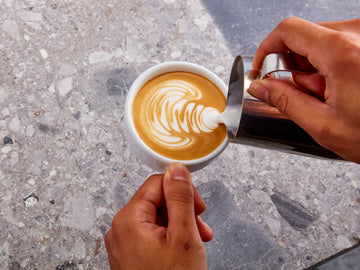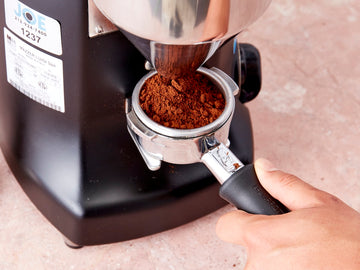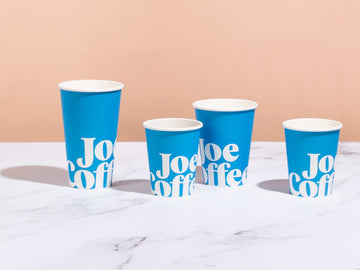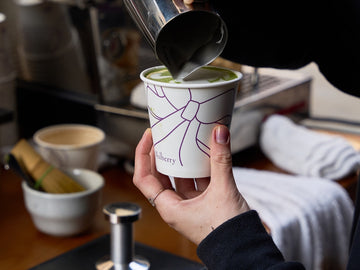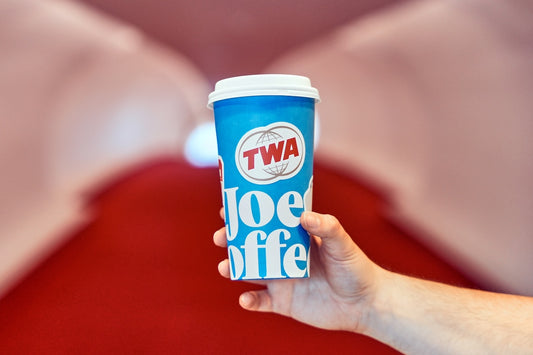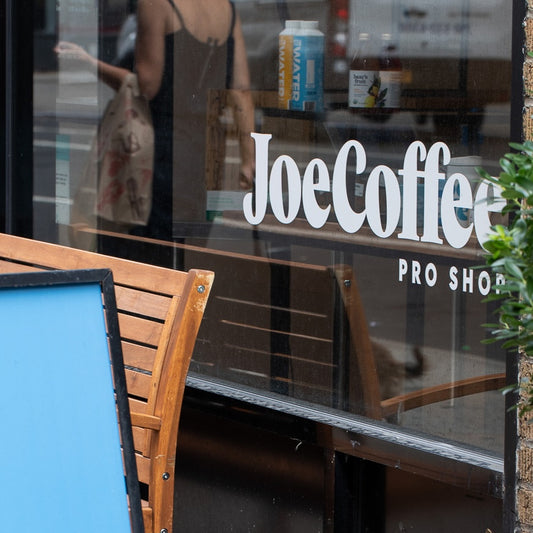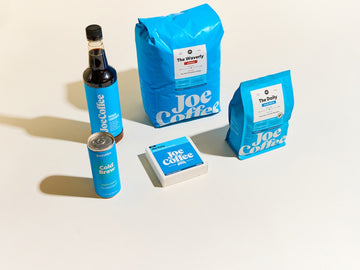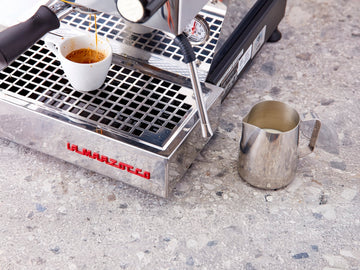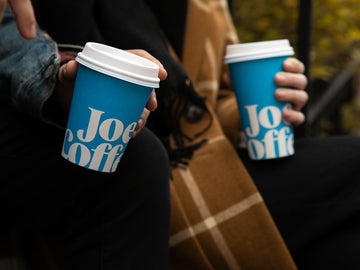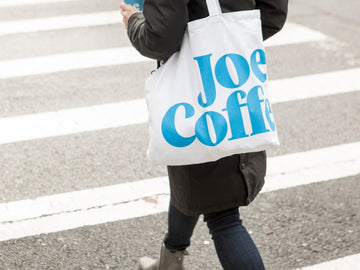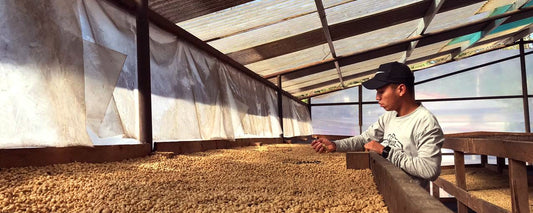Partner Stories
Categories
All articles
Introducing POLLAST!C™ Mailers
Here at Joe, sustainability is always at the forefront of our minds—from our commitment to sourcing Rainforest Alliance Certified coffee and working with partners who prioritize lowering their carbon footprints to composting our coffee grounds in our cafes. So naturally, when we discovered Better Packaging Co's POLLAST!CTM mailers, we were eager to seize the opportunity to make a bigger impact with our packaging choices.
We're excited to announce that our mail orders will now be packaged in POLLAST!CTM mailers, made 100% from ocean-bound plastic collected from coastal communities in Southeast Asia. In these under-resourced regions where very little waste management infrastructure exists, plastic pollution accumulates on beaches and waterways, becoming the source of much of the world's ocean plastic pollution. Better Packaging Co works with these communities to collect plastic from the shorelines, paying a fair wage, which in turn helps lift them out of poverty.
In making this shift, we grappled with the question of the sustainability of a recycled plastic product over a paper or compostable product, and you might be wondering the same thing! Ultimately, we believe we can make a more significant impact with this choice. Here's why: POLLAST!CTM mailers use 75% less CO₂ than a virgin plastic product and 88% less than a virgin compostable bag. They also have a lower carbon footprint than any paper package or recycled product on the market.
What's more, we are actively supporting shoreline cleanups that prevent plastic from entering the ocean and simultaneously helping communities fight poverty. An estimated 5-13 million tons of plastic enters the ocean every year and that figure is expected to triple by 2040. Over 70% of that plastic enters oceans via land and over 80% of that comes from Asia. That's why Better Packaging Co focuses their collection efforts in Southeast Asian coastal communities. In the course of a year, we'll be able to divert the equivalent of 54,200 single-use plastic bags from the ocean! Whether you recycle your package with soft plastics, or dispose of it responsibly at home, the plastic ends up in a better place.
As a company dedicated to transparent supply streams, we also appreciate Better Packaging Co's commitment to traceable sourcing—every mailer comes with a tracing code which you can use to find out where the plastic used to make your mailer was collected! Plug in the code at the bottom of this page to trace your mailer's origin. Even better, as a B Corp Certified business and Certified Carbon Free business, Better Packaging Co works to offset 100% of their carbon emissions. We're excited about this new partnership, and look forward to hearing what you think!
Better Packaging Co's production partner collecting plastic pollution in Malaysia
Mighty Peace: Stories from the Farmers of Congo Umoja
This spring, we released our first single origin from the Democratic Republic of the Congo—a delicious washed Bourbon called Congo Umoja grown by a cooperative of smallholder farmers in Eastern Congo. In exploring this new origin for our menu, we've not only been able to learn more about the complex history of the region and the rich stories of its people, but to develop a new relationship with an inspiring supplier called Mighty Peace Coffee.Born out of the Congolese peace movement by an international team of business leaders, coffee experts, community organizers, and human rights defenders, Mighty Peace Coffee is a fully integrated social impact coffee company connecting roasters like us with the highest quality Congolese coffee. In a model they call the Peace Trade, Mighty Peace aims to share the stories of Congolese partners to inspire, educate, and end cycles of poverty and conflict.In South Kivu, where this coffee is grown, coffee is becoming a symbol of economic stability and prosperity after many years of of violent conflict. Mighty Peace firmly believes that coffee has a major role to play in the future of the region, with specialty coffee agriculture providing community-directed paths from poverty and violence to stability and growth. What follows below are stories directly from some of the farmers who grow Umoja, shared with us by Mighty Peace Coffee. “There is nothing you can’t do when you have a sustainable income.” - Mrs. Victorina Kanane
In the 10 years farmers have been growing specialty coffee cooperatively, the sale of Umoja has helped to improve the living conditions of its members, providing schooling, housing, jobs and reducing coffee smuggling on Lake Kivu, while promoting gender equity. "We use several methods to bring out the best flavors...sometimes we cultivate coffee in the mountain which is different than the coffee we cultivate in the valley.” Mr. Lukuye
Umoja farmers produce fully washed coffee, grown in volcanic soil at an altitude of 1,480-2,000 meters, between Lake Kivu and the Mitumba mountain range. The region has a rich tradition of growing specialty coffee, which is reflected in the complex flavors present in Umoja's complex and sweet profile. “Nowadays everybody here works and has fields to cultivate, it would be insane to kill or rape your neighbor when we’re pursuing the same purpose.” - Ms. Furaya Zahinda
Conflict has plagued the DRC for decades. Intense competition for control over mining areas led to the proliferation of armed rebel groups in the 90s. Armed groups committed acts of unspeakable violence to destroy the very fabric of a community. The effects of this ongoing war reach every corner of the Congo, and yet many communities are coming together as one to plant the path towards a brighter, safer future. "I use my earnings to pay my children’s school fees; four of them have finished high school and one is in the third year of nursing college." - Mr. Sengi Ndambusa
Mighty Peace's values drive ethical practices that include environmental sustainability, USDA organic certification, the highest labor standards, and a commitment to shift attitudes and approaches to business in the DRC and around the world.To learn more about this coffee and the Democratic Republic of the Congo, check out our info sheet.
Women-Led Businesses We Love
You know and love their delicious scones, cookies, turmeric elixir, and vegan bites, but do you know the women behind your favorite treats in our cafes? As we continue to celebrate Women's History Month, we're recognizing the many female founders whose small, local businesses provide the perfect pairings to our coffee, or in the case of one of these founders, brings us your favorite coffee-alternative!Here are their stories. Anjali Bhargava, Resilience Growing up surrounded by Indian culture, food, and philosophy, Anjali always trusted in the power of turmeric. It was her pursuit of wellness and her own health struggles which led her to start Resilience, in 2014. Today, you can find Anjali's sunny, immune-boosting elixir in our hot and iced turmeric lattes, or you can buy the elixir to get creative at home! What is your favorite part of what you do?I love that I make products that brighten people's days. Whether they are drinking it for their health or because they love the taste, it's usually a moment they relish. I think about that every time I take my own first sip of my daily cup of my elixir and it never fails to make me smile.Favorite way to drink Resilience?During allergy season I love it in hot water with a little honey. In the summer I love it in a glass of seltzer or lemonade!What advice do you have for women starting their own business?You're awesome and you have to trust your gut, but your success will be a team effort and the earlier you realize this, the more joy you will find in the journey. Find friends who are in the arena with you, they will understand you and keep you sane. Agatha Kulaga, Ovenly Agatha is the founder and CEO of Ovenly, an award-winning NYC bakery which happens to be one of our oldest wholesale partnerships! You may know Ovenly as the makers of the epic peanut butter cookie or the many delicious loaf cakes in our cafes. Along with her partner Erin Patinkin, Agatha has led Ovenly since 2010, seeing the brand as "an opportunity to change business for the better, while satisfying your sweet tooth." What is your favorite part of what you do? The most rewarding thing is being able to create joy for so many people on a daily basis through the work we do at Ovenly.What's your favorite thing to bake? I love to bake up cream scones because they are a blank (and delicious!) canvas for whatever sweet or savory flavor addition I'm in the mood for. A few of my favorite combinations are Cheddar Cherry Basil, Prune & Ginger, and Milk Chocolate & Salted Honey.Favorite Ovenly item?
That would be like choosing a favorite child! If I could choose three, they would be our Pistachio Cardamom Bread, Blackout Cake, and Peanut Butter Cookie.What advice do you have for women who are interested in starting their own business?The businesses we build can be our strongest voice. As woman entrepreneurs, we have the opportunity to change the world while redefining the idea of success. The key is to do things before you’re ready, otherwise someone might just beat you to it! Danielle Sepsy, The Hungry Gnome
Danielle Sepsy is the founder and Chef behind The Hungry Gnome, makers of the scones, muffins, and nutella-stuffed banana bread we introduced to our cafes last summer. Danielle's love of cooking began at the young age of 13 when she started a home business selling her scones to friends, neighbors, and local cafes and businesses. Today, Danielle is known as the "Scone Queen" by devoted fans, or "gnomies". Keep an eye out for her new seasonal Lemon Poppy Muffin, arriving in April! What is your favorite part of what you do? I love to create new recipes. Sometimes ideas come to me at midnight and I can’t sleep until I make it! I love to create baked goods and dishes that are new and innovative, but also really nostalgic, so when people take a bite it may bring them back to a really special moment in their life. Watching people eat and enjoy my food is the best feeling in the world, and it makes all the hard work worth it.What's your favorite thing to bake?My favorite item is the Chocolate Chip Scone partly because it is how the business started! I am also a serious chocaholic and so the melty semi-sweet chips combined with the buttery, crisp, yet moist dough is something I can never get sick of.What advice do you have for women who are interested in starting their own business?Learn from others first. Gain experience in the field your starting the business in so you can learn the ins and outs, no matter how “small” the job may be. If it’s a restaurant for example, learn how to do the finances, but also how to use (and fix) the dish machine, trust me it’ll all come in handy. Building relationships is also a key to success whether it be with vendors, potential customers, employees or perhaps a mentor. When I started my business I knew just to who call when it came to ordering supplies and ingredients to which employees I wanted to hire.
Caitlin Makary, Dank Brooklyn
Fueled by a passion for banana bread, Caitlin founded Dank Brooklyn in Bed Stuy in 2016. We love Dank not only because their mini vegan loaves are delicious, but because Caitlin has worked to build a company that truly supports its people and community. What is your favorite part of what you do?My favorite part of owning my business is working with other amazing owners / managers around the city and working with the groups we support. I love meeting new people, which is easy when we have clients all over the city! Being able to experience so much of NYC and combine my personal interests (bike riding, climbing, social justice) together with my job has been incredibly fulfilling.Favorite Dank item?The first and only item we offered when we started in 2016 was the Chocolate Chip Banana Bread; so that will always be a favorite. However the Lemon Matcha is probably my new favorite. I had no experience working in food prior to starting Dank (I used to be a clothing designer), so recipe testing still makes me a little nervous... we were supposed to launch this flavor in March 2020 and had to wait until November. I'm SO happy with how it turned out!What advice do you have for women starting their own business?Trust your instincts and your experience. The only way to try something new is to start from the bottom, which is hard if you are leaving an established career. Try to learn as much as you can from others, never be afraid to ask questions, and Google everything! I started this business with literally zero prior food experience; I had never even waitressed or bartended. I leaned hard on my design experience for our voice and branding, my experience working in an office to get our back systems set up and organized, and my friends/family who worked in food to give me feedback and advice, and my NYC community to show us love and support. 5 years later we've made it through a pandemic; and kept *all* of our staff paid their regular wages throughout. Never give up but don't be afraid to shift directions. I've worked harder on this business than anything else I've ever done, but it is my favorite job I've ever had. :) Karen Lauterstein, Sattva Vida Ever since we began carrying Karen's energy bites in 2017, they have become a mainstay on our counters, fueling many-a-New Yorker with their vegan, gluten-free goodness! After 20 years in corporate America, Karen channeled her passion for clean, home cooked food into Sattva Vida, which translates to "pure life" in Sanskrit. Sattva Vida's mission is to help busy people trade their processed, sugar-filled snacking habits to simple, fresh food. What is your favorite part of what you do?Hearing positive feedback from our customers about our Energy Bites! Especially, when they tell us our bites helped them stop eating processed sugars, or jump start a healthier lifestyle. I came from the corporate world, so I also love waking up every day (without an alarm clock!) and building my business in a tee shirt, jeans & a smile. It's exciting to carve a completely new path for myself and my company—learning, growing, and building every day.Favorite Sattva Vida energy bite?It's a toss up! I'm really feeling Off the Walnut these days. That flavor happens to be the first one I ever made.What advice do you have for women starting their own business?I keep two inspirational quotes above my desk, "Be brave, not perfect" and "You have to believe in yourself—that's the secret."* As for tactical advice, NYC has tons of free & incredible resources for new entrepreneurs—from mentors, to workshops, to full length courses with certificates. I've probably taken advantage of all of them, including: SCORE, Evergreene Exchange's SFPN (Small Food Producers Network,) Kauffman FastTrac (New Ventures Program,) the SBA etc.Specifically, SCORE has a team of 75 experienced mentors who you can meet with for free. They have various areas of expertise such as legal, marketing, retail, distribution, finance, etc., I've been meeting with my mentor, Elliot, regularly for years now. His guidance, support, mentorship and friendship has been invaluable. Go to SCORE, get a mentor or two. Take classes, network, and go to events & pitchfests. Research what your business will need early and often. Last but no least, have fun and enjoy what you do!*quotes, Reshma Saujani and Charlie Chaplin Kate Wheatcroft, Bien Cuit
In 2011, Kate and her husband, James Beard Award finalist Chef Zachary Golper, opened Bien Cuit in New York's Boerum Hill. Since then, Bien Cuit has become a neighborhood staple and destination for some of the city's finest breads and pastries (like the croissants you'll find in our cafes). With her husband overseeing the culinary side of the business, Kate has helped expand the business over the last decade to encompass two bakeries, wholesale, and e-commerce. What is your favorite part of what you do?My favorite part is starting new projects. This year during the pandemic we really built out our e-commerce business for the first time and it has been really exciting!What inspired you to open Bien Cuit?My husband and business partner is a baker by trade and he had spent a decade working as a baker. I agreed to help him get started. I think I didn't realize exactly what I was signing up for, but have had a lot of fun!Favorite Bien Cuit item?Chocolate croissant—it is a classic and I'm a huge sucker for both chocolate and flaky pastry.What advice do you have for women starting their own business?Make sure to pace yourself. It is easy to think you should take every opportunity that comes your way, but being really discerning I've found is the key to success.
Women in Coffee: Interview with Jeanine Niyonzima-Aroian
As we celebrate Women's History Month, we reflect on the many incredible women we work with throughout the supply stream—from strong leaders within our team to our wonderful partners whose work continually inspires us. One such partner we're proud to work with is Jeanine Niyonzima-Aroian, owner of JNP Coffee, an importing company focusing on promoting and trading African specialty coffee.We first met Jeanine at the New York Coffee Festival in October 2019 and her work in gender equity in Burundi resounded with us deeply. Soon after, we released a coffee from JNP Coffee to our Atlas Collection, a special line of coffees which aims to highlight each of our sourcing values. This coffee, from the Karehe Washing Station, was chosen to represent our sourcing value of ethics for the many ways it spoke to Jeanine's work to uplift and empower the communities where she works in Burundi. A year later, we're excited to welcome another coffee through JNP, Turihamwe IWCA, to our Atlas Collection later this month.In anticipation of this upcoming release and in celebration of Women's History Month, we present this interview with Jeanine. Hi Jeanine! Thank you so much for speaking with us. Can you introduce yourself?My name is Jeanine Niyonzima-Aroian, owner of JNP Coffee and founder of Burundi Friends International.After a 20-year career in international business, what led you back to Burundi, and ultimately into the coffee industry?Initially, what led me back to Burundi was a calling to give my people a helping hand. I was one of the fortunate ones who left the country to secure a higher education and was blessed with a great career. Burundi is one of the poorest countries on the planet. I knew I needed to do something. Through the non-profit, Burundi Friends International (BFI) that I founded in 2008 while living and working in California, we were able to empower women, youth and families to build self-sustaining communities. What started with teaching English Communications classes for youth that didn’t have the money to attend college has grown to serve more than 75,000 students across all provinces in Burundi. They have six container-libraries, dozens of smaller libraries (mostly in schools) and 1,000 English Clubs, plus full college scholarships for more than 40 students in Burundi.Like many, I stumbled into coffee by accident. On my trip to Burundi with the BFI board in 2010, I met the head of USAID who insisted that I consider the coffee industry. Later on, I ran into my cousin who was in coffee. He had just built a wet mill and asked me to help him. Then women farmers and members of IWCA Burundi, who had received goats through a BFI project, approached me to buy and market their coffee. Before too long, I found myself as a shareholder in several wet mills in Burundi. I took the opportunity to promote quality coffee with high premiums (a second payment to farmers), then collaborated with NGOs like PCI Global and BFI to bring financial literacy to farmers. Each step brought another element of sustainability to the model we established.Growing up in Burundi, was coffee always part of your life?Not at all. Tea is the culture. Coffee is a cash crop for farmers in Burundi. Most of them can’t actually afford a cup of coffee!What is JNP Coffee’s mission? Do you work exclusively with the IWCA (International Women's Coffee Alliance) chapter in Burundi?JNP Coffee’s mission is to use coffee to alleviate poverty in Burundi, to share Burundi’s exceptionally delicious coffee with the world, to educate and empower farmers, and to build sustainable communities through coffee. And no, we don’t work exclusively with the IWCA Burundi Chapter, although in 2018, JNP Coffee underwrote 100% of their production. Some of our current successful programs, like that of “Turihamwe Turashobora” coffees were with the farmers who were founding members of the IWCA Burundi Chapter.[caption id="attachment_46985" align="aligncenter" width="1280"] The women of Turihamwe take time to dance together in celebration of the joy and community that they feel.[/caption] What are some of the biggest challenges that women in coffee face in Burundi?Lack of access to land ownership, lack of education, and lack of opportunities in general.JNP Coffee is known for enabling gender-sensitive development strategies at origin. What does this mean?Through my mother, I learned quickly at an early age that if you empower a woman, you have a chance to improve the future of a family. When you empower a woman in a place like Burundi, you ensure that funds will go to feed the children and take care of the needs in the home. Women will share their knowledge with other women to improve the community’s quality of life. In our women’s savings and microlending program with BFI, the repayment rate is almost 100%. I can go on and on. Even in large US corporations, those with women in leadership perform better than their counterparts.How do you think supporting gender equity impacts the sustainability of the industry?I don’t see any other way. In places like Burundi, women are the ones working the land, taking care of the coffee trees among other crops. If we want to sustain the coffee industry, we need to emphasize quality, pay good money for it, and bring in other programs to allow farmers to diversify their crops and income, in addition to education. Also, in places like Burundi, contrary to countries like Brazil, the harvest is small and with the right support, the opportunity to produce mostly specialty grade-coffee every year is very attainable.JNP Coffee emphasizes the power and importance of partnership to support inclusive economic growth. Can you tell us a little bit about your work to promote financial literacy among women coffee growers?Education is critically important to economic development yet significantly lacking in Africa. In Burundi, less than 2% of the population has access to higher education. For most people, it’s not a lack of willingness or capability, but a lack of opportunity. I use every opportunity I have to bring education home, at origin. Through BFI, in collaboration with PCI Global, we have been able to bring a very impactful financial literacy program to women farmers, now expanded to youth in Burundi. The program provides a space where women can meet to learn about leadership, and a platform for saving and lending to each other. Some of the women farmers in the program pooled their resources and went on to start their own wet mill in 2019. They are now producing an exceptional coffee, like Turihamwe. To me, that is a good example of an inclusive economy, where women coffee farmers can build and own their own wet mill.How do you measure the impact of implementing equitable practices at origin? Is this something you’ve found challenging? We measure the impact of implementing equitable practices at origin through the example of the women of Turihamwe Turashobora group. By providing access to education, financial resources and leadership, women farmers could build and manage their own wet mill, and the cup quality also speaks for itself. It’s been very challenging in a place like Burundi, where women traditionally don’t have a voice. I struggle with it myself throughout the supply chain, but it does not stop me from persisting. It is a must in Burundi, where women are an untapped resource with tremendous potential.[caption id="attachment_37041" align="aligncenter" width="1280"] Jeanine inspecting drying beds at the Karehe Washing Station[/caption] Can you tell us about your experience as a Black woman in specialty coffee? How does it compare to your experience as a Black woman working with producers in Burundi?I love being a Black woman in coffee. This is where I belong. I can represent my fellow women farmers in Burundi right here in the consuming country. However, this does not make it any easier doing business as a Black woman in America. I face the same discrimination as any other Black person in the US, but when I go home to Burundi, the farmers of Burundi are my people and I owe them everything to represent them well. That said, I still face the same gender prejudice and inequality as a businesswoman in Africa. However, I view it as an opportunity to be a role model for other women in Africa, America and the world.What can you tell us about our upcoming release, Turihamwe IWCA, and the women who produced this coffee?Turihamwe coffee is a perfect example of an important story. Women farmers who were IWCA members got together, saved their money as they learned to do in our financial literacy program, and then built and started their own wet mill operation in 2019. Now they are producing a coffee that is outperforming many others. That’s why in Kirundi, its name means “together.” Indeed, together, we can succeed and make a difference. Thank you for allowing us this opportunity. All photos courtesy of JNP Coffee
Joe x Fincas Mierisch: A Chat with Amanda Byron
Inspired by our recent launch of The Mierisch Project Box Set, we took a trip down memory lane with Amanda Byron, Joe's first Director of Coffee, to learn more about the origins of our relationship with the Mierisch family. To explore these early beginnings, we would be remiss not to first introduce you to Amanda. Not only was Amanda Joe's first Director of Coffee, she was employee number one, helping our founder Jonathan Rubinstein open Waverly Place. In those early days of specialty coffee in New York City when latte art was still a novelty, Amanda was our go-to pourer of latte art, which meant that at first, our Waverly cafe hours were built entirely around her availability. During her 13 years at Joe, Amanda became a vital part of our growing company, touching nearly every part of the business, including getting our roasting operation off the ground in 2013. Our relationship with the Mierisch family, who is deeply intertwined in the Joe Coffee story, spans several countries and many years, but can be traced back to meeting Steve Mierisch in New York. We first met Steve when he worked in sales and customer service for our coffee provider at the time, Ecco Caffe (which later became Intelligentsia). Steve, whose family owns Fincas Mierisch in Nicaragua and Honduras, eventually went on to open the Pulley Collective, a shared roasting space at the Liberty Warehouse in Red Hook, Brooklyn. It was here in this 19th century waterfront warehouse, and thanks to Steve, that we got our start in roasting.[caption id="attachment_45316" align="alignnone" width="1280"] Pulley Collective[/caption]The Beginnings of Pulley Collective & Joe RoastingIn the days when we were purchasing coffee from Intelligentsia, Amanda often traveled to Chicago to visit their roastery. On one such trip, she can recall sitting in the booth of a dark bar with Steve and other folks from Intelligentsia when he told her about his idea to open a co-roasting space in New York. Although she'd never heard of such a thing before, she had a feeling it could be a good fit for Joe. Making the move to roasting our own coffee was something that had been at the back of Amanda and Jonathan's minds for some time." Once we got to a certain number of cafes, it just made sense to take production like this in-house," she explains. "I don't know how things would be if Joe didn't have that as a stepping stone."[caption id="attachment_45313" align="aligncenter" width="1280"] Amanda with Ed Kaufmann, Former Director of Sourcing, in 2014[/caption]From Pulley Collective to Sourcing From Fincas MierischOnce we got going at Pulley, it was only a matter of time before we began sourcing coffee from Fincas Mierisch and got to know the rest of the family. Although our first "Joe" coffee wasn't a Mierisch coffee (it was actually from our partner Wilmar Guarnizo), our sourcing relationship began soon after we began roasting all of our own coffee. Amanda recalls, "When we first started roasting, we only did 10% and the other 90% came from Intelly. But once we started roasting 100%, my guess is that a Mierisch coffee was on that menu very early on. It was also the first relationship we had where we traveled to the farm to select lots." When asked if she has any favorite memories from her sourcing trips to Nicaragua, Amanda says, "So many! I just remember thinking it was truly one of the most beautiful places I'd ever seen. I felt so lucky to be able to see the entire coffee process as it happened and to do that with the Mierisch family was really special. I loved riding in the back of the pickup truck, I loved the food (and the Flor de Cana!), I loved wandering through endless coffee trees and tasting coffee fruit. My understanding and love of coffee deepened and grew so much during those trips as did my relationships with the people who I got to travel with."[caption id="attachment_45314" align="alignnone" width="1280"] Amanda with Eleane Mierisch in 2014[/caption]Setting the Tone for Future PartnershipsVisiting the Mierisches in Nicaragua every year has become an integral part of who we are, and this foundation of friendship has truly set the tone for how we've evolved as buyers of green coffee. "There's a certain legitimacy of having real genuine relationships with the people who are producing your coffee. It takes you to a different level," Amanda says, "It not a 'direct trade' that's just for show." As we've grown and forged new partnerships around the world, we've held on to this as an important example of what a sourcing relationship can and should be. Importantly, as with any relationship, we believe that the value in our sourcing relationships must flow both ways. In this pandemic climate where coffee producers are shouldering an even greater share of the risk, it has been an opportunity for us to experience how we can share risk more equitably and a good reminder of how important it is to be honest business partners. That's why we were eager to collaborate with the Mierisch family on The Mierisch Project Box Set, to provide a sales outlet for this special trio of coffees which were grown, processed, imported, and roasted (at Pulley Collective!) entirely by the family. Shop and learn more about this collaboration here.[caption id="attachment_45345" align="aligncenter" width="1280"] On a sourcing trip in 2015[/caption]
Q&A with Fincas Mierisch
2020 has been a difficult year up and down the coffee supply stream. With demand on the decline, producers like our friends at Fincas Mierisch have had difficulties finding buyers for their high-quality, meticulously cared-for coffees. As roasters, we too have felt the constraints caused by the global health crisis, unable to be the good partners we have been in the past, but eager to help. This dynamic is what led us to collaborate on the release of the The Mierisch Project Box Set, a collection of three special coffees from the Mierisch family's farms in Honduras. As a vertically integrated business, Fincas Mierisch is responsible for producing, exporting, importing, and roasting this coffee. We're excited to be able to offer this incredible set directly to our customers—an effort to share risk with our friends and partners in an unprecedented time.On the heels of the release of this set, we took a moment to connect with Wingo Mierisch to hear how they've fared this year.Q: How has the pandemic affected you all personally?
A: The pandemic has been especially hard because we lost someone that was with Fincas Mierisch for over 50 years: Enrique Morraz. Losing him was like losing a family member. Our dear farm manager of our farms in Honduras passed away due to Covid in July.
Q: When did the worst of the pandemic hit Nicaragua, and what was the response from the community and local authorities?
A: May/June were the worst months for the pandemic in Nicaragua and Honduras as this was the time when hospitals reached full capacity. The Nicaraguan government initially didn’t take the virus very seriously, even claiming that it was just another strain of the flu so their response was really slow and inadequate. No restrictions or work closures were enforced in Nicaragua. Honduras had a better response, they closed their borders (essentially locking us out of Honduras since March) and restricted the days and where people could travel (also which business were allowed to stay open). However, these restrictions in Honduras did have a toll as many producers were not able to buy all necessary supplies to prepare for the next harvest and many had issues with coordinating exportation dates with the shipping lines that were working with minimal staff. In Honduras local authorities, such as the ones near our farms, restricted access in and out of the villages. Local authorities in Nicaragua were initially pretty relaxed but now there is an information campaign going on to inform and educate people on best practices to prevent the spread of Covid. Especially in Nicaragua, the brunt of the burden was taken on by individuals, communities, and private businesses to instill and follow safety protocols.
Q: Did you take on responsibility for your crew in ways that differed from the official/governmental response? How were your teams affected by all of that?
A: In Nicaragua we pretty much had to take full responsibility for our crew as the government response was inadequate and neglectful. We made sure to purchase and hand out masks and alcohol gel/spray to our entire team, enforced social distancing, created smaller crews/shifts, and we even have taken the extra step to hold meetings with our team and fellow producers to talk about best safety practices to prevent the spread of Covid. In Honduras, thankfully the government has been more helpful with their response so we do not have to take on as much responsibility with providing PPE, as the government was giving these out, but we still made sure to educate and try to enforce from afar the proper safety protocols. After the death of Don Enrique we paid out of pocket to get everyone at our farms in Honduras tested for the virus.
Q: Did you see a difference between the impact of the virus in Nicaragua and Honduras?
A: It’s difficult to tell exactly how Nicaragua was affected as the government hasn’t been releasing information (and the information it does release should be taken with a grain of salt). But from what we can tell Honduras, the country, was affected more probably because of the higher population and very densely populated major cities (Tegucigalpa and San Pedro Sula). Official death tolls in Honduras are much higher than the official death tolls in Nicaragua (but again, take the Nicaraguan death toll with a grain of salt).
Q: What are some of the long-term effects that you are experiencing now, ~9 months after the virus started to make waves in the world?
A: We’re noticing it’s definitely affecting everyone and every market. No one has escaped untouched. Early on this meant that many pre-orders were not fulfilled by our buyers and we were left with inventory very late into the season. In Nicaragua we just finished exporting our last container in September, we usually finish in June. For Honduras it meant we had to make a decision: leave the coffee in the country and run the risk of not making a significant return on the coffee, or take a chance and export it ourselves to the US to be sold spot. We went with the latter plan and it has fortunately worked out much better than expected and it led to this wonderful project we get to work with Joe Coffee.
Now, it’s just created uncertainty for both producers and buyers as no one knows how this pandemic will play out. As producers we worry that the market won’t be there to purchase our new harvest as we cannot afford another late season like last harvest. It will be all the more difficult as many buyers have already informed us that they will probably not be able to visit origin to purchase coffee. This will entail mailing out more samples than usual which does come at a considerable cost.
Q: Are there things you still need or still look for support for when it comes to safety during the pandemic?
A: I think we have mostly everything in place to continue preventing the spread of the virus in both countries, but educating people on the protocols that need to be taken and preventative measures will always continue to help.
Q: Were you able to participate in the Nicaragua Cup of Excellence (COE) this year since it wasn't cancelled due to Covid?
A: COE has not taken place yet but there are plans for it to go forward this year in Nicaragua and if it does, we will most likely participate. We are still unaware if COE will take place in Honduras which we hope it does.
Thank you both and Joe Coffee for your support on this project. With 2020 being a rough year for everyone we are super grateful and blessed to be working with you on this. It truly means a lot!
Q: How have you fared with the impact of Hurricanes Eta and Iota?
Honduras definitely took the largest hit from Eta, many casualties and damages, we were fortunate that no one from our team got harmed. The farms experienced mudslides and the dirt roads to and from the farm unusable but no real damage to the trees/harvest thankfully. We're extremely anxious to be able to go back, its been so long but I believe the borders are opening up soon. Nicaragua got a lot a rainfall, which damaged some small lots that were drying from the crazy flowering harvest, and the few ripe Laurina cherries that were there popped or fell to the ground (most likely got contaminated) but we still need to cup them first! We were very fortunate that no one was harmed but the Caribbean/Atlantic coast of Nicaragua was hit hard.
COE shared some really helpful links to donate to for Hurricane Eta.
https://www.gofundme.com/f/LSV-ETA-Relief-Fund
https://support.crs.org/donate/hurricane-eta
Field Report: Harvest During the Pandemic
Here in the United States, the pandemic dealt a painful blow to the specialty coffee industry with cafes shuttering across the nation in an effort to stop the spread of COVID-19. However, these same preventative measures have caused daily life to grind to a halt even in the most remote coffee-growing corners of the world, cutting off producers from the labor upon which they depend during harvest season, curbing vital transportation, and increasing production costs.Because the coffee harvest season arrives at different times around the world, some producing countries were just finishing their harvests when the pandemic began to spread globally, while in other regions, the harvest was just getting underway. With travel bans in place and our usual origin trips cancelled, we've been checking in on our partners virtually to see how they're adapting to these challenging circumstances. Here are some of their stories, which we'll be sharing in several parts over the coming weeks.
Part 1: Veloso Family, Brazil
Cerrado, Minas Gerais, BrazilHarvest Time: May-JulyThe Veloso family supplies a key component of many of our year-round coffees. Anike Wolthers of Red Container Coffee visited the Veloso farms during harvest and reports back.Read more: Part 1: Veloso Family, Brazil Part 2: Ejo Heza Cooperative, Rwanda
Mushubati, Rutsiro District, Rwanda
Harvest Time: April-MayThrough Ruth Ann Church of Artisan Coffee Imports and Kopakama's Quality Control Intern, Grace Izerwe, we present several interviews with Ejo Heza farmers.Read more: Part 2: Ejo Heza Cooperative, Rwanda Part 3: The Guarnizo Family, Colombia
Tarqui, Huila, Colombia
Harvest Time: April-July, October-DecemberFor the producers of longtime customer favorite, La Familia Guarnizo, collaboration among the family's nine siblings has been key to navigating the pandemic.Read more: Part 3: The Guarnizo Family, Colombia Part 4: Kibingo Washing Station, Burundi
Kayanza Province, Burundi
Harvest Time: April-MayBurundi's delayed and scattered government response prompted private actors like Kibingo Washing Station operator Greenco to take matters into their own hands.Read More: Part 4: Kibingo Washing Station, Burundi
A Day in the Life | On The Family Farm with Andrea Rubí
Wonder what the average day for a coffee farmer in Honduras is? Our partner Andrea Rubí, who grew up on her family's Fincas Ruland farms and now manages their specialty farm, Finca Ruland 2, transports us to the farm to share a day with us.[caption id="attachment_19337" align="alignnone" width="1024"] Andrea pictured with her mother, Suyapa and sisters Angie and Brenda[/caption]5:00 amWhen a new coffee harvest begins at Fincas Ruland, our obligations start very early morning, since the coffee pickers begin to arrive at the farms at 6:00 am. My day begins with a good cup of coffee because the harvest in Honduras takes much of our winter; they are very cold mornings. The good thing about living on the farm is that I'm never late for work! My mother, together with my sisters, will have already distributed the work of the day, and each one knows the area to cover. Usually I take care of the coffees on Finca Ruland 2, our specialty farm.6:00 amAt this hour there is a group of coffee pickers ready to be taken to Finca Ruland 2. It takes us 30 minutes to get to Finca Ruland 2, and the weather changes completely on the way up, since we go from being 950 meters above sea level where we meet at Finca Ruland 1 to 1400 meters above sea level on Finca Ruland 2. Once we arrive, the coffee pickers get ready with their baskets to start their day and head to the area where the coffee of the day will be hand picked. We are always reminding them of the importance of picking the ripe fruit, and being careful with coffee plants. At this time of the morning, the mountain of Santa Barbara is still covered in mist, you can still hear the singing of the birds, and a cold breeze that runs across our faces.
8:00 amUsually after making sure that everything and everyone is settled, I return to Finca Ruland 1 for breakfast and then continue with the work of the day. Finca Ruland 1 is the oldest farm where we have built all the infrastructure to process our coffee, after having my breakfast there is a full staff on our de-pulping machines, washing coffee, and managing coffee being dried on raised beds.9:00 am – MiddayDuring this time of the day, you will always find me in these areas above supervising the process of coffee, and once de-pulped, in the areas of fermentation, washing tanks, and drying. There is always a lot to do. It's at this stage where mistakes can be made and spoil the coffee harvested from the previous day, or it is where we can grow those magical flavors behind our coffees. We try to give leadership and decision-making input to our workers to examine the criteria they have when a situation arises. This is also how they learn from coffee and not only come and do the work, but because they know the importance to manage times, temperatures, and separate coffees by picked dates and varieties.
12:00 pmIt's our lunch break and I go home to eat something. There's not always time to sit down and grab a meal—there are days when a large volume of coffee is handled since there are two farms producing at the same time, so when we're caught up in so much work, one of us prepares food at home and takes it to wherever we are, or we enter the house for something quick and get back out.1:00 pm – 2:00 pmAlthough I am in charge of Finca Ruland 2 and the coffee process. I am always available to help my mother and my sisters with what comes from Finca Ruland 1. My mother has always liked to walk along the trails of the farm, closely supervising the coffee plantation that’s being hand-picked and always motivating the pickers. It is worth mentioning that our house is built in the middle of Finca Ruland 1, therefore we are surrounded by coffee! Living on the farm makes us more committed to people, because we look closely at their needs and daily concerns, It makes us see the reality that hits us as a country, and allows us to keep on top of everything. We become an octopus, as in full hands on, as my mother says: we are everywhere.
2:00 pmI prepare to return to Finca Ruland 2. My mother and my sisters are getting ready because at this time there are usually coffee pickers ready to measure how much coffee they’ve picked during the day in Finca Ruland 1 and we are in charge of receiving the coffee picked daily.Sometimes one of my sisters or a trusted collaborator comes with me to Finca Ruland 2. When I arrive, the coffee plantation is still being picked, which gives me time to take pictures of them or the farm, I supervise what they have done during the day, I talk with the supervisor of the farm, and we square up jobs or ideas for the next day.
4:00 pmThe pickers start to bring the coffee they’ve picked throughout the day for it to be measured. With their help, we measure and load the truck. Once we're ready, we head back to Finca Ruland 1, where we unload the coffee and it is put in the hoppers of the de-pulping machine to leave this coffee in the fermentation tanks to work on next day.
6:00 pmAt this time, since Finca Ruland 1 grows conventional coffee, therefore has more coffee volume, there are still pickers who take advantage of the last remaining rays of sunlight to continue picking, and we have to wait for them to receive the coffee. This coffee is taken to a coffee de-pulper in a village 15 minutes from the house, as our own wet mill is usually busy processing the specialty coffee from Finca Ruland 2. While some collaborators are waiting for the Finca Ruland 2 coffee to be ejected, others are loading the trucks with the Finca Ruland 1 coffee for it to be taken to pulp out.We don’t have a specific clock-out time since there are days that we have finished at 8:00 pm, and there are some other days that it's 10:00 pm and we are still at the wet mills. Usually work ends for us when the work area is clean and ready for the next day. The world of coffee can be very exhausting during the harvest—not only physically but also mentally. It takes long and heavy work days, which are made up for by the great work team that Fincas Ruland have which one way or another motivates us and helps us with our duties and underscore our commitment to offering excellent coffees for our customers.
Meet the Producer: A Q&A with Eleane Mierisch
Eleane Mierisch is the dry mill manager, head of quality control, and producer of our new release, Nicaragua La Escondida, from Fincas Mierisch. She's also a Cup of Excellence head judge, and served as a panelist at the inaugural Women in Coffee Project panel event, founded by our Director of Roasting, Amaris Gutierrez-Ray.Eleane was born into a coffee farming family in Nicaragua. Her father, “Doc” Mierisch, is a third generation coffee grower, and even though he pursued a career in gynecology he maintained a passion for the cultivation and innovation of his family’s coffee farms. During the political turmoil of the 1980s, however, the Mierisch coffeelands were seized by the government and they were forced to leave their home in search of a sustainable future elsewhere. This brought them to Tennessee. There, Eleane learned English, and after several years of living in the U.S., Mexico, and the U.S. again, she started studying nursing. She completed her bachelor's degree and went on to get her nurse practitioner's certification, all while paying her way through by working at her father's OB/GYN practice.When it was safe to return, her parents reverse emigrated to Nicaragua. A few years later, Eleane followed to care for her mother during the final stages of her battle with cancer. She describes this as the hardest time in her life. Staying there with close family, and spending a lot of time with her father who had a renewed vision to rebuild his coffee farms, took her on a slow journey to find peace, and, after a time, to find her future in coffee.[caption id="attachment_14436" align="alignnone" width="1280"] Photo by Tobin Polk[/caption]In 2010 she was asked to translate for the Cup of Excellence (CoE) in Nicaragua, and she began learning how to cup coffees. Her first experience cupping included 540+ coffee samples, at which point she knew she had found her passion. The following year, she took the calibration test, which she didn't pass, but she took it again the following year and her hard work paid off. She's now a Head Judge for CoE and has served on three international juries.She also stepped into a position of leadership at the Beneficio Don Esteban dry mill, which is owned by her family. She wanted to do it right, so she worked her way through every role in the organization, from raking and piling the coffee at different times of day to drying it on the patio, to rotating coffees on raised beds, to managing space and inventory of lots in the bodega throughout a harvest, to distinct lot separation, to cupping in the lab for quality control, to setting aside time to spend with visiting clients, to exporting lots in shipping containers after sales.[caption id="attachment_14429" align="alignnone" width="1280"] From left to right: Maria Macy (Reception), Maira Avilez (Exportation), Érica Blandino (Bodega), Haisell Beteta (General Manager of Personnel), Toñita Ruiz (Head of Patio), Eleane (center)[/caption]Management and creativity took over, and under her leadership, over 25% of the coffees yielded by Fincas Mierisch are now specialty. She works hard alongside her team to learn something new every day, values becoming more specialized, and prioritizes facing the future with a positive mentality. Her openness is reflected in all parts of her life. She is an openly gay woman working within a conservative culture, and her drive for professional growth—for herself and her whole team—in a male-dominated industry is inspirational.When asked if she would be interested in sharing her story with us, she was immediately enthusiastic.How did your relationship with Joe Coffee begin? We began a direct relationship by selling coffee to Joe in 2013 when they began roasting at Pulley Collective in Brooklyn. The team at Joe is engaging and reliable, super supportive of Fincas Mierisch, and practices conscientious purchasing. We've hosted them for a week every year at our farms ever since—Joe feels like family.What do you like about the friendship?We’ve built a solid working relationship that doesn’t feel like work at all! I believe our friendship now goes beyond that, it’s more like family. Thank you for inviting me to be a judge the Northeast Roaster Forum competition and also to be part of the Women in Coffee Project. I applaud Joe on how engaged you are in the roasting community and educating others—inspiring.You came out a few years ago. Can you share a little bit about your experience and how you have navigated your personal life in a relatively conservative county? Has it ever been an issue?During my youth, it was really difficult for me to accept myself. When I was growing up, being gay was not socially accepted, and gender roles were strict and narrow. I moved to the U.S. when I was 11. I went to middle school, high school, and college in Texas, and moved back to Nicaragua in my mid-thirties. Spending my formative years in the states helped me come out, even though I grew up in a conservative area.Still, I was worried how people would perceive me when I moved back to Nicaragua. But I remained strong, and firmly held to my thoughts, convictions, pride, and sense of self. You have to. Someone very important to me, very special in my life, motivated me to defend myself, and little by little things have changed.I can’t deny that when I first came out that I had doubts, and felt that people would not respect me. Personal acceptance is what gave me confidence and kept me going. I fully invested in myself and my career, grew professionally and personally doing what I love the most. Growing up in a conservative town, in a conservative culture was difficult, but also defining, and made me stronger. It’s what taught me resilience.Everything I have lived (the good and bad and in between) has shaped me and made me the person I am today. Cultural and social mentalities have evolved over the years, and each new generation is stronger and safer. Each new generation leans more towards a new society of free minds, without prejudice.Will you celebrate Pride in any way in Nicaragua or anywhere else?I celebrate myself everyday. I am always proud. In Nicaragua Pride is not customary, it’s a fairly small celebration in comparison to the U.S. Also, in these difficult times, freedom of expression is repressed and forbidden. It is risky to raise your voice, because the LGBTQ community does not agree with the current government, and has suffered persecution.***Read more about Eleane's career path in her full interview with our Director of Roasting for the Women in Coffee Project series on Daily Coffee News.To celebrate Eleane and La Escondida, Joe will distribute $1 from each bag sold to the Audre Lorde Project in New York, the Attic Youth Center in Philadelphia, and Colectivo de Mujeres in Nicaragua, an organization based in Matagalpa which supports the LGBTQ community, as well as the rights of women and children.

